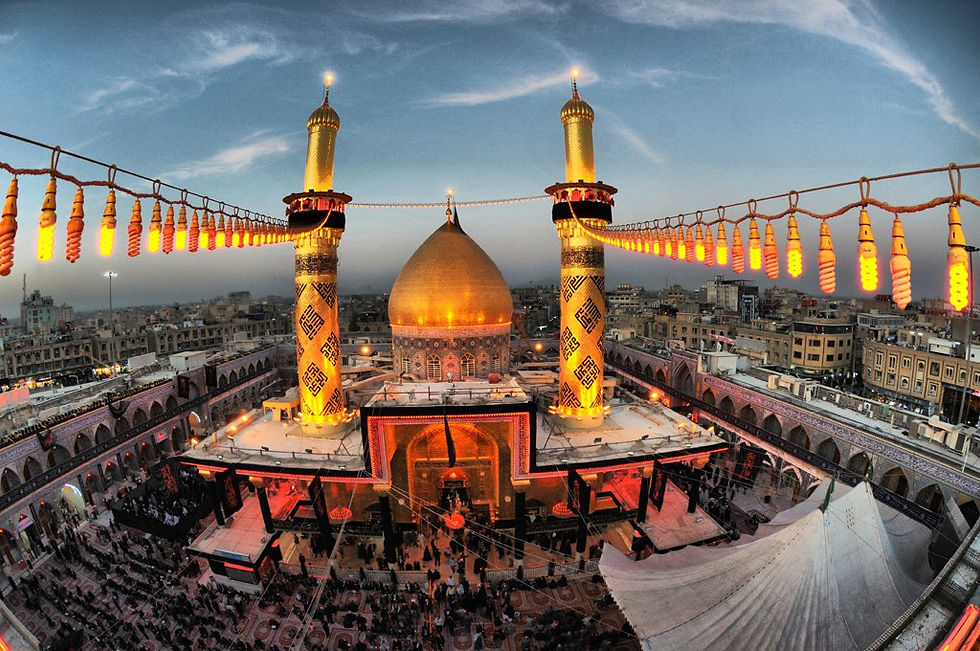THE SHRINE OF HAZRAT ABBAS - KARBALA
Here are some important details about this revered site.



THE SHRINE OF HAZRAT ABBAS (as)
Al-‘Abbās ibn ‘Ali (Arabic: العباس بن علي, Persian: عباس فرزند علی) also Qamar Banī Hāshim[6] (the moon of Banu Hashim), (born 4th Sha‘bān 26 AH – 10 Muharram 61 AH; approximately May 15, 647 – October 10, 680) was the son of Imam Ali, the first Imam of Shiite Muslims and the fourth Caliph of Sunni Muslims, and Fatima bint Hizam, commonly known as Mother of the Sons (Persian: 'أم البنين').
Abbas is revered by Sunni and Shiite Muslims for his loyalty to his half-brother Hussein, his respect for the Households of Muhammad, and his role in the Battle of Karbala. Abbas is buried in the Shrine of Abbas in Karbala, Karbala Governorate, Iraq, where he was martyred during the Battle of Karbala on the day of Ashura.
Early Life
Abbas was the son of Ali ibn Abi Talib and Ummul Banin. Abbas had three brothers – Abdullah ibn Ali, Jafar ibn Ali, and Usman ibn Ali. Narratives state that he did not open his eyes after he was born until his brother Hussein took him in his arms.
Abbas married a distant cousin, Lubaba. They had three sons – Fadl ibn Abbas, Qasim ibn Abbas, and Ubaydullah ibn Abbas.
Death
The Euphrates river was occupied by Yazid I's army to prevent the camp of Hussein from getting water. Because of his skill and bravery, Abbas could have attacked Yazid I's army, occupied the river, and retrieved water for the camp alone. However, Abbas was not allowed[clarification needed] to fight. He was only allowed to get water. Thus, he went to the river to get water for the children in Hussein's camp. Sakinah was very attached to Abbas, who was her uncle. To her, Abbas was their only hope for getting water. Abbas could not stand to see her thirsty and crying, Thy thirst!. When Abbas entered the battlefield, he only had a spear, and a bag for water in his hands. He was also given the authority to hold the standard in the battle.[clarification needed] Once he had made it to the river, he started filling the bag with water.
Abbas's loyalty to Hussein was so great that, though he was very thirsty, Abbas drank no water because he could not bear the thought that Sakinah was thirsty. This story illustrates how Abbas conquered the Euphrates river, held it with his mighty hands, yet still did not drink. To this very day, the water of the Euphrates winds past the grave of Abbas. After gathering the water, Abbas rode back towards the camp. On his way back, he was struck from behind, and one of his arms was amputated. Then he was struck from behind again, amputating his other arm. Abbas continued, carrying the water-bag in his mouth. Yazid's soldiers started shooting arrows at him. One arrow hit the bag, and water poured out of it. Immediately after the bag of water was hit, the enemy shot an arrow at Abbas that hit his eye. One of Yazid's men hit Abbas' head with a mace, and, lacking the support of his arms, Abbas fell off his horse. As he was falling, he called, "Oh brother!", calling for Hussein]. Abbas fell on his face before he let the standard fall.
He was killed on Friday, the 10th of Muharram, 61 AH, near the bank of the river Euphrates. Hence, he is called the "Hero of the Euphrates". His death is generally commemorated by the Shiite Muslims on the night of the 8th of Muharram. Muslims, particularly Shiites, mourn the death of all the martyrs who fell at the Battle of Karbala with Hussein in the Islamic month of Muharram, mainly in the first ten days of the month. Fadl ibn Abbas and Qasim ibn Abbas also laid down their lives in Karbala. Ubaydullah ibn Abbas lived to continue the lineage of Abbas[clarification needed] with five sons of his own.
Abbas was buried at the spot where he fell from his horse in Karbala, Iraq. The Shrine of Abbas was built around his grave, at which millions of pilgrims pay homage every year. The Albanian Bektashi community also maintain a shrine to Abbas on the summit of Mount Tomorr, where an annual pilgrimage is held every August.




HIGHLIGHTS:
-
Karbala is reputed to be the city where Husayn, the grandson of the Prophet Muhammad, was martyred (his body but not head is buried there, and is known as Mashhad Husayn). Karbala is also the site of two important Shiite mosques, Al Abbass Mosque and Imam Hussain Mosque. Shiites observe a 40 day mourning period for this Imam every spring followed by a pilgrimage to this site.
-
Najaf is the site of Ali ibn Abi Talib's tomb known to Shiites as "the wondrous place of martyrdom" and site of one of the world's largest and most important Muslim cemeteries. Najaf is also the site of Imam Ali Mosque one of the holiest Shi'ite mosques.
-
Samarra is the site of Shiite Al Askari Mosque.
-
Kadhimiya (north of Baghdad) is regarded as a holy city in Shia Islam. Musa al-Kazim and his grandson, the ninth Shia Imam, Muhammad at-Taqi are both buried there, and their tombs are contained in the Al Kadhimiya Mosque. Shia go on an annual pilgrimage to this shrine in rajab
-
List of mosques and shrines in Iraq - https://en.wikipedia.org/wiki/List_of_mosques_in_Iraq

